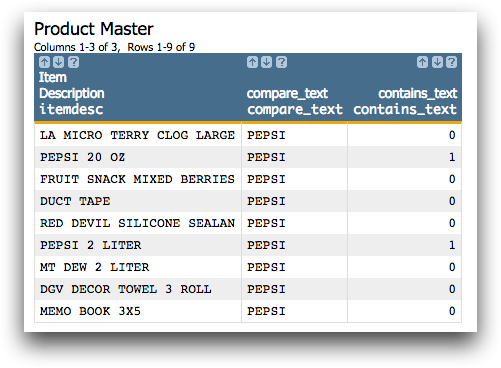strcount(X;Y)
Returns the number of occurrences of a given substring within a given string.
Syntax
strcount(X;Y)
bstrcount(X;Y)Input
| Argument | Type | Description |
|---|---|---|
X |
text | The string on which to apply the function A scalar value or the name of a column |
Y |
text | The substring to search for in XA scalar value or the name of a column |
Return Value
Returns an integer value corresponding to the number of occurrences of the substring
Y within the string X.
If X is N/A, the result is 0.
If Y is N/A, the result is the number in characters of X,
which is equivalent to strlen(X).
Sample Usage
value |
substring |
strcount(value;substring) |
|---|---|---|
| 'banana' | 'an' | 2 |
| 'banana' | '' | 6 |
| '' | 'an' | 0 |
Example
The following example uses strcount(X;Y) to find whether a text value in a
given column is contained as a substring within another text column.
<base table="pub.demo.retail.prod"/>
<willbe name="compare_text" value="'PEPSI'"/>
<willbe name="contains_text" value="strcount(itemdesc;compare_text)"/>
<colord cols="itemdesc,compare_text,contains_text"/>In the table pub.demo.retail.prod, a new column named
compare_text is created that has the text value PEPSI.
The column contains_text consists of the results of
strcount(itemdesc;compare_text), which is the number of times the text
value in the compare_text column occurs in the text value in the
itemdesc column. If the value in contains_text is
greater than 0 for a particular row, the text value in compare_text is a
substring of the text value in itemdesc.
The results of running this query would be:

You can see in the image above that the string PEPSI appears in two rows
in the itemdesc column.
Additional Information
strcountis Unicode (UTF-8) compliant and will work with Unicode or plain ASCII text fields.- If passed a string argument that is not legal Unicode, it will by default signal an error (configurable as a user preference).
- A corresponding function
bstrcountcan be used with non-Unicode strings (e.g., binary or legacy encodings).
